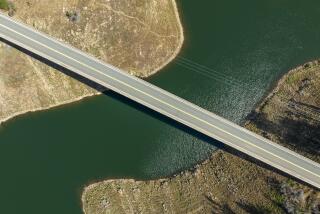State Drops Request to Ease Sensitive Delta Regulations : Water: March rainfall makes the plan unnecessary, officials say. Environmentalists said the proposal would have threatened fish and wildlife.
SACRAMENTO — With torrential March rains boosting reservoir storage, state officials announced Monday that they no longer need to relax the standards governing the amount of fresh water flowing to the sea to ensure minimum deliveries for Southern California.
State Department of Water Resources officials had asked for relaxation of the water quality rules in the Sacramento-San Joaquin River Delta when it appeared that this would be the driest year on record. They said Monday that March rains increased reservoir storage enough so they can now afford to release the amounts of fresh water necessary to prevent further seawater intrusion into the delta and comply with salinity standards.
“We asked for that (relaxation of the standards) originally to help our carry-over (reservoir) storage. We believe the March rains have helped us resolve that issue,” said Larry Mullnix, water resources department deputy director.
The delta, an environmentally sensitive estuary that supports numerous species of fish and wildlife, including some that are endangered, is the critical transfer point for state water shipped from Northern California reservoirs to drought-weary cities in the south. Some of the delta’s fresh water must be allowed to flow to the sea in order to hold back seawater intrusion, a factor that constantly presents water officials with a tough balancing act to satisfy environmental and water-user concerns.
Concerned that reservoir levels had become critically low after nearly five years of drought, the department estimated it could save about 350,000 acre-feet of water if the standards were temporarily eased during the summer months. An acre-foot of water serves a typical Los Angeles family of five for 18 months.
The department request was bitterly opposed by environmental groups that argued that salinity standards were not strict enough as it was and to allow more salt water in the delta could threaten already stressed fish and wildlife.
On Monday, the Department of Fish and Game told the State Water Resources Control Board that stressed fish and wildlife would need about 170,000 acre-feet of additional water to get through the summer.
Dick Daniel, program manager of the agency’s fish and wildlife division, asked for 60,000 acre-feet to be released in the delta in a four-day period in May to help the spawning of striped bass. He said another 110,000 acre-feet would be needed for irrigation of federal and state migratory waterfowl refuges in the San Joaquin Valley.
He acknowledged that with water supplies still well below normal, officials have not determined where they will get the additional water for fish and wildlife.
Despite March rains producing three times the normal precipitation for the month, Larry Gage, operations officer for the State Water Project, said 1991 is still expected to be classified as a critically dry year. He said department hydrologists estimate that the Sacramento River Basin will produce 9.1 million acre-feet of runoff, compared to a normal level of 18 million acre-feet.
More to Read
Sign up for Essential California
The most important California stories and recommendations in your inbox every morning.
You may occasionally receive promotional content from the Los Angeles Times.










